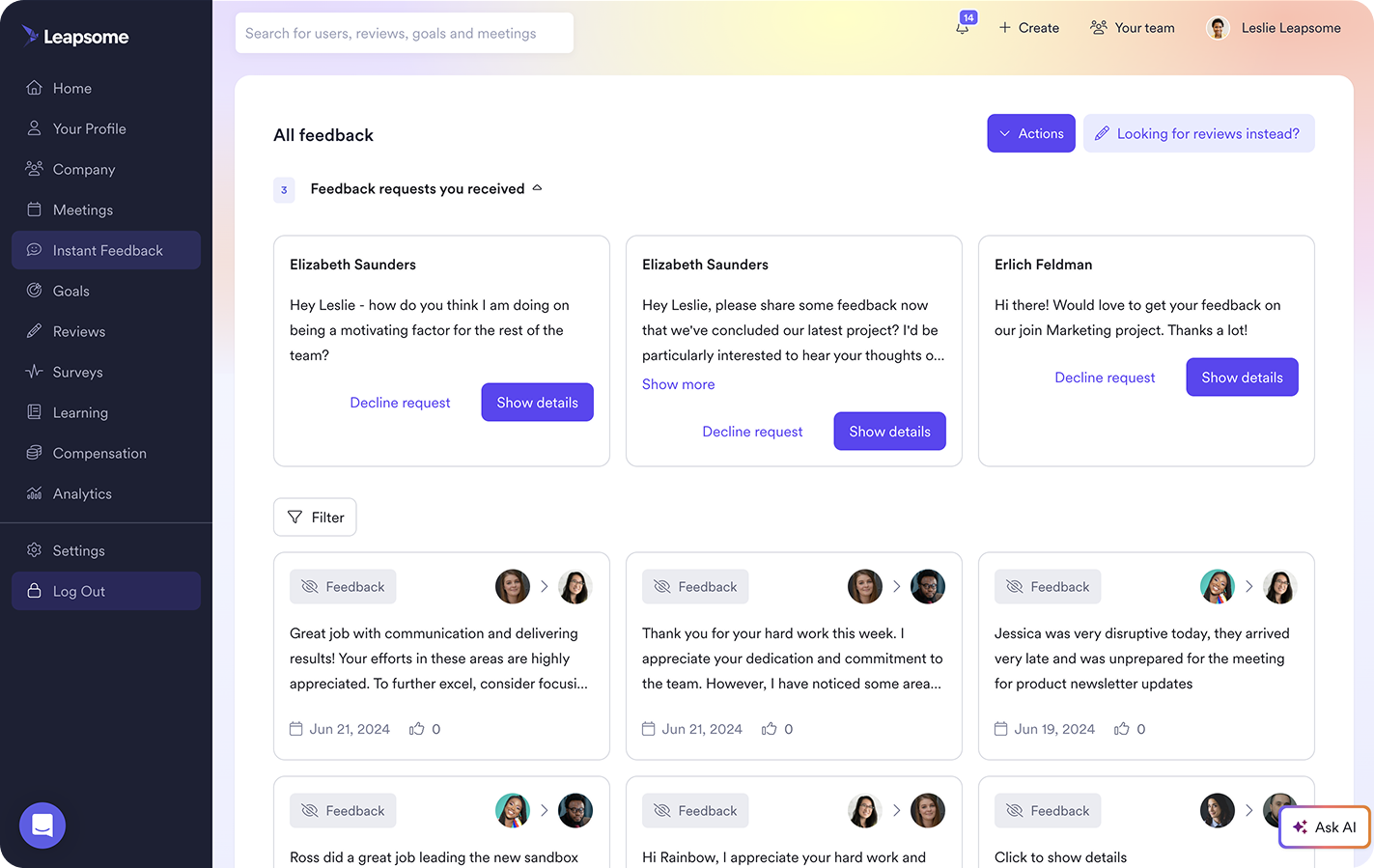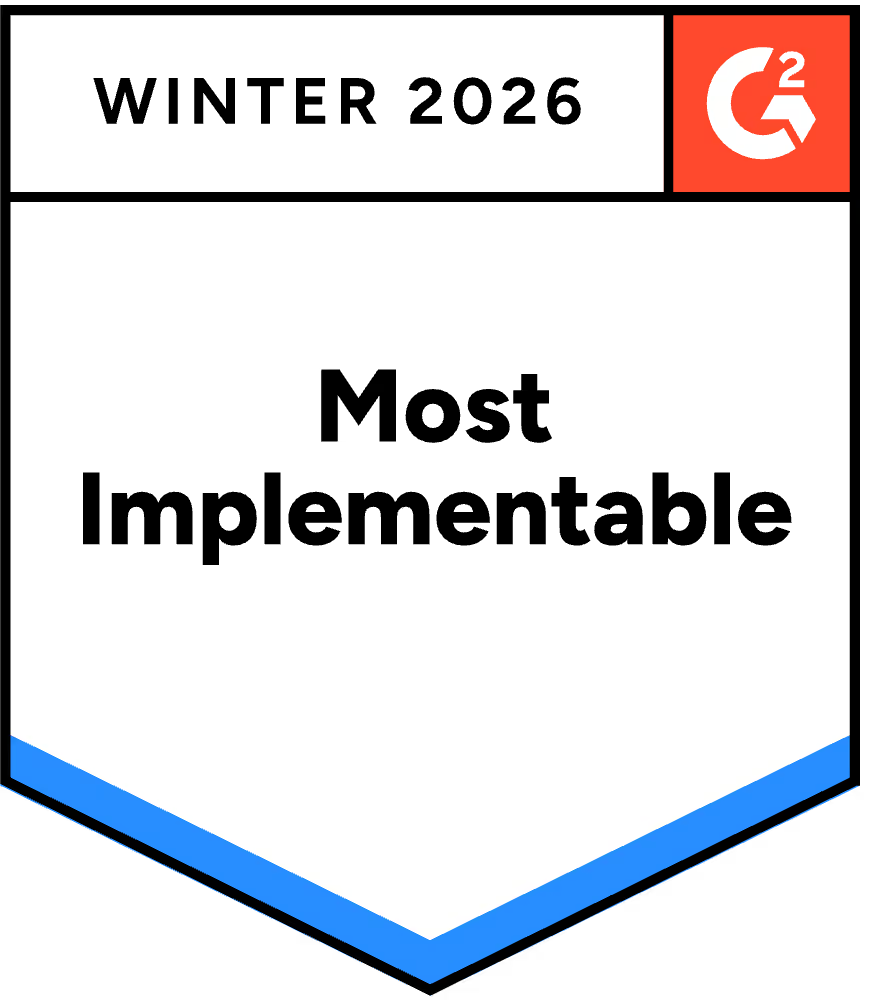Team celebrations at work: a guide for managers
%20(1).jpg)
For people-first organizations, recognition is an essential, ongoing practice — not merely a fringe benefit. They understand that implementing a team celebration the right way can lift spirits and serve as a signpost for employees that they’re on the right track with their performance and development.
Sadly, recognition and appreciation can get overlooked among all the other projects and initiatives pulling leadership focus, especially amidst economic upheaval. That’s likely why in a recent study, only one in three U.S. workers reported that they’d received praise for work in the past week. (1)
It’s time for organizations to make team celebration a priority again rather than putting it on the back burner — especially when three in four team members say they want more feedback and recognition from their managers. (2)
Your employees are the driving force of your organization, and it’s possible to make them feel valued without costly events or generic tokens of appreciation. That’s why, in this article, we discuss:
- Why celebrating success is essential
- What professional celebration looks like
- How to know when to celebrate and what to avoid
- Team celebration ideas for various workplace contexts
- Gallup, 2024
- Leapsome Workforce Trends Report, 2023
🚀 Fuel innovation and collaboration with regular feedback and praise
Leapsome’s feedback platform helps you give recognition where it's due and view employee wins when it’s decision-making time
👉 Learn more
Why should we celebrate success at work?
“Success can beget success, and celebrating at work helps to build momentum, improve morale, and make the hard times feel all the more worth it.”
— Andy Parker, Head of Marketing at Leapsome
A recent study showed that 37% of employees feel encouraged to do better work if they receive personal recognition. Even more compellingly, people who feel recognized at work are 2.2x more likely to bring new ideas and innovation forward. In our own State of Enablement Report, we found that 52% of employees place a culture that encourages feedback, goal-setting, and learning among the top reasons they want to stay in their current jobs.
There are even more benefits to team celebrations beyond retention. According to the late organizational anthropologist and CEO Judith Glaser in a piece for Psychology Today, celebrating success stimulates feelings of “inclusion, innovation, appreciation, and collaboration” in the brain, which pave the way for creative thinking, calmer work environments, increased focus and resilience to stress — even during periods of high pressure.
Let’s not forget that human beings are inherently social: it’s no accident that we call our firms organizations and companies, where progress relies on cooperation. Company celebrations are cornerstones of social bonding that foster a shared group identity and a sense of belonging. If you like the sound of loyal employees and strong work culture, it’s time to up your celebration game.
What does a professional celebration look like?
.png)
Recognition software like Leapsome Instant Feedback syncs with Slack and Microsoft Teams so you can incorporate moments of appreciation into your workflows
According to Gallup, meaningful public and private recognition are bigger motivational perks than a promotion, bonus, or raise. However, you can’t shortcut your way to giving recognition — and having an official rewards and recognition program does not automatically guarantee your employees will feel authentically recognized.
Traditionally, though, employers have had a hard time figuring out where team celebration fits within the everyday work setting. Many are willing to acknowledge career success but may consider “celebration” an off-hours, leisure-time activity. At the same time, leadership may remember to congratulate employees on promotions and big sales but forget to celebrate the smaller week-to-week wins that enable steady overall growth.
Some team leads worry that celebrating small wins will invite complacency or distract people from upcoming goals. Others simply aren’t used to receiving praise themselves, and don’t associate celebration with ongoing success.
CEO of IPD David Villa admits he used to feel that celebrating small wins wasn’t important and would distract employees from reaching their goals. “You see, often we’re so busy and so consumed with trying to reach our goals that when we finally do, we simply say, ‘What’s next?’ I used to agree with this concept,” he says. “I thought that by ignoring small wins I was simply displaying my hunger and drive to reach new heights. The reality is that we are doing a disservice to our team and ourselves by stepping over moments for celebration.”
Celebrating success is a process, not an end-game

Employee success is not about getting from A to B but finding a way of working that fosters creativity, fulfillment, and continuous progress. Think of it as a well-designed wheel rather than a simple straight line.
Without a mountain top or finish line, it’s up to leaders to find work celebration ideas that make sense “on the go” rather than waiting for team members to get to some indeterminate final destination.
How do I know when something is cause for celebration?
“When good performance comes with appropriate, honest, and well-deserved praise, employees feel they are trusted and supported by their boss.”
— Judith E. Glaser, CEO & Organizational Anthropologist
A workplace celebration should feel special, so it’s important to choose the right moments to celebrate. Avoid going into overdrive and celebrating every day or making it too prescriptive. Recognition should be natural and authentic, coming from a genuine place of appreciation. Here are some scenarios in which you might want to celebrate an employee.
Achieving a first win
This is particularly relevant for new hires and anyone testing new responsibilities or challenges. Praising someone when they get it right for the first time — then easing off the praise as it becomes second nature — is a great way to instill confidence in a team member trying to grow.
Making a difference to someone else
Small things can count for a lot. Acknowledging the moments when employees support one another — when they take on someone’s workload so they can go on holiday, for instance — reminds people that their actions make a difference.
Aligning with company values
Celebrate clear demonstrations of your company ideals to reinforce your values and how they promote great work. Jot down some clear guidelines and offer examples so employees know how to acknowledge the impact their team members have and when they’re embodying a shared team or company value.
Delivering exceptional work at a senior level
When it comes to more senior employees, you might want to save your praise for specific occasions, like completing a critical project or milestone. Why? Unlike new hires and junior employees, too much “confidence boosting” can seem condescending or unnecessary to team members at an advanced level in their careers. That doesn’t mean you should never praise more experienced employees — just be mindful of getting the balance right!
Demonstrating consistency
Many of your employees are responsible for those ongoing, repetitive, or unglamorous tasks happening in the background. Once in a while, take the time to notice people who always do great work but rarely receive praise. Show them you don’t take their reliability and perseverance for granted.
How to implement work celebration ideas the right way

Consider how you want to express your gratitude. What kind of workplace celebration ideas would particular employees benefit from? It’s no good thanking someone in a way that leaves them feeling uncomfortable or overlooks the work of their collaborators.
Additionally, make sure the praise stays proportionate. You don’t need to send your newest team member a bouquet and chocolates just because they got to the end of the week. It’s more important to think about what you want to say beforehand. When in doubt, think about action, impact, and reward (AIR):
- Action — Start by outlining what the team member did to create a positive impact. It could be something finite and specific, like getting a report done, or an ongoing behavior that makes a difference in the long run. Give details to show their work has been noticed!
- Impact — Get specific about how this team member’s work allowed others to succeed. For example, “Your excellent research on EMEA markets meant our presentation was even more compelling to the C-suite!”
- Reward — Consider an e-card signed by everyone on the team for small wins. For more significant occasions, you could offer additional perks like flexibility on an upcoming project or an extra day of PTO.
🌟 Great work deserves to be celebrated
Leapsome Instant Feedback allows you to showcase company shoutouts on an internal Praise Wall and make feedback a part of your everyday work culture.
👉 Take a tour of Leapsome
How to empower different personalities with the right message

Taking the time to learn how employees prefer to receive praise shows you’re willing to go the extra mile to make them feel valued and needed. Follow these sample scripts to offer encouragement to your multifaceted team members.
For introverts and remote employees: a handwritten note or e-card
“I’m writing to recognize the quality of the report you just handed in. It was clear, thorough, and well-presented, and you should be proud of it! Thank you for all your hard work! In our next 1:1, let’s come up with something new and interesting for you to work on.”
For senior managers: a conversation that doesn’t eat into their work hours
From a supervisor: “Your quality of work is always so high, I don’t always feel the need to congratulate you on your wins because they come so consistently. However, on this occasion, I wanted to celebrate the way you executed our company event: It was a truly inspiring feat that resulted in many more qualified leads than we anticipated!”
From a direct report: “I was really inspired by the company event you organized! Not only did I learn a lot from the talks, but I feel like I’ve also seen how great events can be when they’re done at the highest level!”
For someone who hasn’t been feeling challenged: a department-wide email
“I wanted to take a moment to acknowledge the work that you’ve done over [x] period of time. I know it hasn’t been the most stimulating aspect of your role, which makes your ongoing hard work and attention to detail even more impressive. It makes such a difference that we can always depend on this task to be done on time.”
For a particularly social person: an announcement during a group meeting
“Hi everyone, let’s all use this time to acknowledge [X]’s hard work this month! As well as doing the sales presentation she had two new hires to train, three out-of-town conferences and non-stop sales calls with big clients. Well done for keeping up the good energy even when things didn’t go to plan — let’s all go out to her favorite restaurant for a well-earned meal!
For new hires: a private conversation
“I just wanted to meet to talk about the research you’ve been doing lately. I’m really pleased to see you taking ownership of these new responsibilities. It’s encouraging to see you getting better so quickly at [x], and I was particularly impressed by [y]. I was wondering if there’s a particular side of the project you’d like to specialize in next?”
For a team: a company-wide email or morning announcement
“Congratulations and thank you to our product team for the complete makeover of our UI — our customer success team has reported lots of great feedback since the project, and it’s exciting to see what you’ll do next. To celebrate, we’ve decided to finish the day early and go to an outdoor event for the rest of the day!”
Team celebration ideas: How other companies recognize their employees

When celebrating bigger wins, it’s a great idea to pair praise with a token of gratitude. That doesn’t necessarily mean changing your compensation plan and giving someone a performance bonus. Beyond traditional financial incentives, other celebrations at work can include:
- A shout-out on social media
- An extra day of paid holiday
- A ticket to a seminar, event, or workshop of their choice
- An external skill certification
- The chance to represent the company in some way
- A new responsibility
- Opportunity to work on a unique project
Additionally, here are some ways companies choose to celebrate teamwork and success as a community, circulating appreciation around the workplace and encouraging everyone — not just executives — to celebrate wins:
- Give back to a local community (team event)
- Hold recognition workshops to give employees a chance to share their work
- Display recognition and praise around the office (Leapsome’s Praise Wall is a great way to do this.)
- Let people go home early
- Host an office party
You can also leverage recognition internally to boost engagement or externally to share with your network:
- Share an employee’s story on LinkedIn
- Write about important company milestones and projects on your website
- Have employees present the outcome of an important project in an All-Hands meeting
- Reshare and like posts from your employees with your company profile
- Share employee stories during hiring interviews
Here’s what to avoid in a team celebration
Too many organizations pay lip service to the idea of work celebration without considering what it really means to employees — or thinking about the harmful impact it could have if done insensitively. Some examples of this include:
- Only ever giving the spotlight to one individual or team
- Splashing out on a flashy event when the company has been under financial pressure
- Sharing champagne in the office to celebrate the work of someone who doesn’t drink
- Congratulating a team lead without acknowledging the work of their team
- Organizing a Saturday outing to thank a colleague with caregiving commitments
- Never expressing specific thanks to individuals and only celebrating big team wins
- Making a grandiose show of gratitude once a year, but otherwise showing disinterest
Motivate and empower your employees with Leapsome

Team celebration at every level is essential to creating a motivating work environment. A strong culture of praise increases engagement and productivity, bolstering organizational resilience amidst a turbulent economy.
Still, it can be challenging to do this consistently, at scale, without the right processes and tools in place.
Fortunately, Leapsome has the templates, workflows, and integrations organizations need to build appreciation into their everyday practices. Use Leapsome Instant Feedback to request feedback, send real-time private input, and share praise publicly via the Praise Wall feature. It allows you to increase transparency within your organization with anonymous suggestion boxes and Q&A boards, where team members can ask challenging questions and receive honest answers. Best of all, it integrates with Slack and Microsoft Teams, which means that no feedback gets lost in the shuffle.
With Leapsome in your tech stack, you can foster transparency and continuous improvement while ensuring team members feel engaged and energized by their work.
😁 Make celebrating your employees fun and easy
Leapsome Instant Feedback allows you to give praise where it’s due — either directly to the individual or shared with the whole company.
👉 Book a demo
Related articles
Back to the blogReady to transform
your People operations?
Automate, connect, and simplify all HR processes across the employee lifecycle.
.webp)
.webp)
 Request a demo today
Request a demo today































